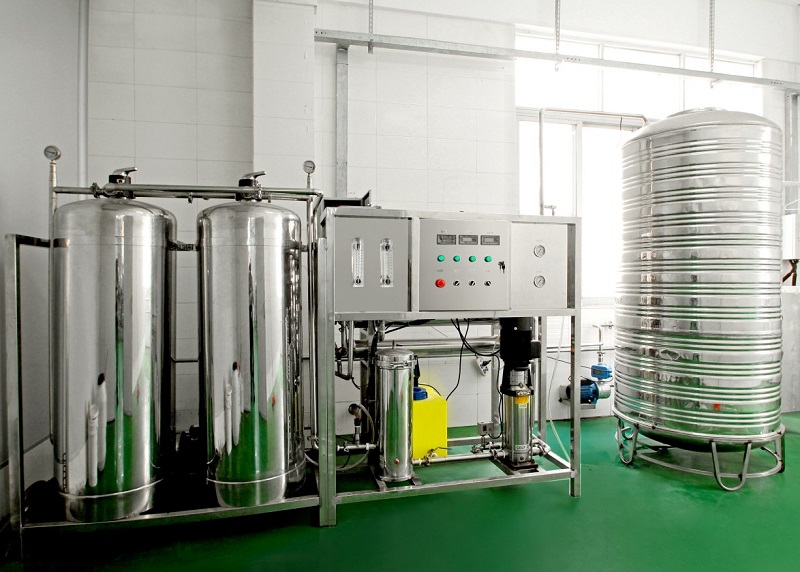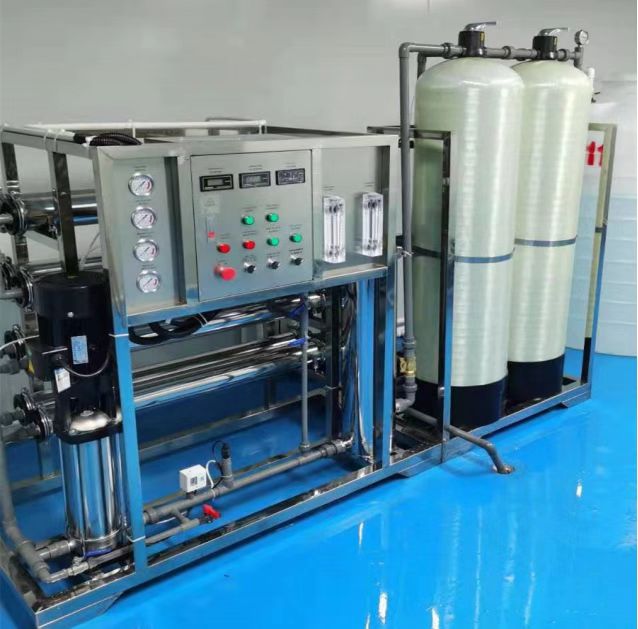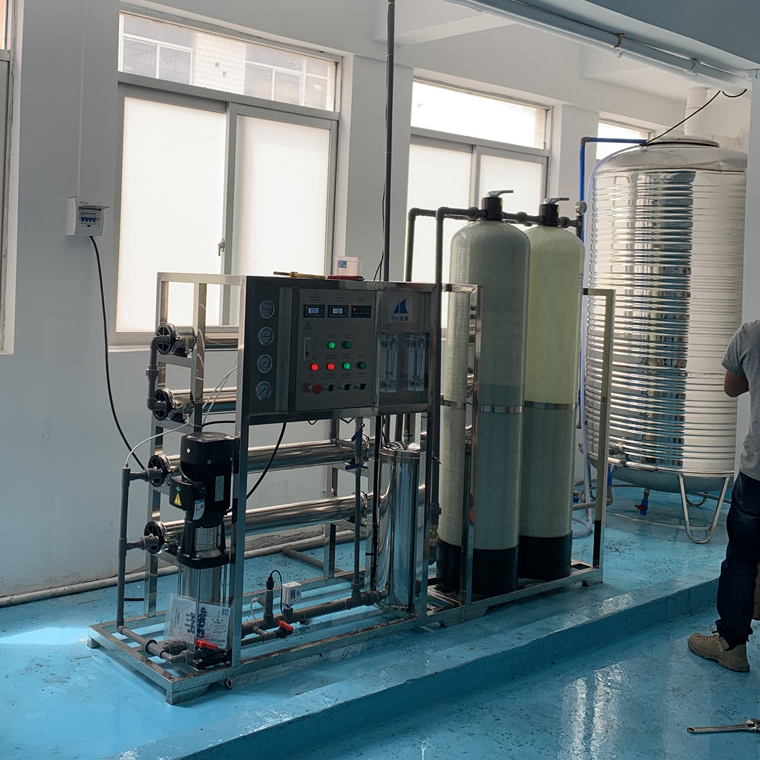Pure Water Reverse Osmosis Filter: The Ultimate Industrial Water Purification Solution
YUANYANG’s Pure Water Reverse Osmosis Filter delivers top-tier industrial water purification, ensuring maximum purity and efficiency. Engineered for durability and performance, it’s the solution for clean, safe water in industrial applications. Experience reliable filtration with YUANYANG today.
- What Is a Pure Water Reverse Osmosis Filter?
- Definition and Core Function
- How It Differs from Traditional Water Filtration Methods
- Key Components of an Industrial RO System
- How Does Reverse Osmosis Work in Industrial Water Purification?
- The Step-by-Step RO Filtration Process
- Types of Contaminants Removed
- Common Pre-Treatment and Post-Treatment Stages
- Benefits of Using Pure Water RO Filters in Industrial Applications
- High Water Purity and Consistency
- Lower Operating Costs Over Time
- Compatibility with Various Industrial Needs
- Limitations and Challenges of RO Filtration Systems
- Wastewater Production and Recovery Rate
- Energy Consumption Concerns
- Maintenance and Membrane Fouling Issues
- Industrial Use Cases for Pure Water RO Filters
- Electronics and Semiconductor Manufacturing
- Pharmaceutical and Biotech Industries
- Food and Beverage Processing
- Boiler Feedwater and Cooling Systems
- How to Choose the Right Pure Water Reverse Osmosis Filter for Your Facility
- Key Selection Criteria
- Customization and Scalability Options
- Compliance with Industrial Standards
- Pure Water RO Filter vs. Traditional Water Filters: A Side-by-Side Comparison
- Filtration Precision and Purity
- Operational Efficiency and Cost
- Use Case Suitability
- Conclusion: Why Pure Water Reverse Osmosis Filters Are the Future of Industrial Water Treatment
What Is a Pure Water Reverse Osmosis Filter?
In manufacturing industries where water quality has a direct effect on the product yield and machinery performance, it is not a matter of preference that ultra-pure water should be attained, but rather a requirement. A pure water reverse osmosis filter is a sophisticated water purifying machine that employs membrane separation technology in the removal of dissolved solids, microorganisms, and other impurities in water. The filtration system is essential in the generation of highly purified water to be used in pharmaceutical manufacturing, food and beverage production, electronics fabrication, and chemical processing.
Reverse osmosis systems are pressure-driven molecular filtration systems, unlike conventional water filters, which are based on the use of mere barriers or media-based filtration. The outcome is a significantly greater degree of purity and dependability of water. To see the worth of it, it is worth looking into its basic characteristics and the comparison to the older filtration technologies.

Definition and Core Function
Simply put, the reverse osmosis system pressurizes water and passes it through a semi-permeable membrane, which prevents most contaminants, only letting pure H₂O molecules through. This is a high-precision process that allows the rejection of total dissolved solids (TDS), heavy metals, viruses, and bacteria on a molecular level—with a rejection rate of 95-99 percent. This is important in quality assurance and compliance in industries that use high-purity water.
How It Differs from Traditional Water Filtration Methods
Conventional filters, e.g., activated carbon or sediment filters, are mainly used to eliminate visible particles or certain chemical substances such as chlorine. They are not effective against dissolved salts and pathogens. A reverse osmosis filter, on the other hand, uses pure water and provides a multi-stage filtration solution that guarantees deeper purification and is thus suitable in sensitive and high-stakes industrial applications.
Key Components of an Industrial RO System
An industrial RO system has a number of major components: high-pressure pumps, pre-filters, RO membranes, flow control valves, and post-treatment components. These components are in synergy to deliver uniform, purified products regardless of the fluctuating water conditions. Smart monitoring and automated flushing cycles also improve performance and the life of the system.
How Does Reverse Osmosis Work in Industrial Water Purification?
In order to understand how effective reverse osmosis water purification systems are, one should examine the technology that makes them work. The RO process is a process that operates in a reverse manner of natural osmosis. A force is exerted to push the contaminated water through a membrane that is selective to water molecules but not to dissolved impurities. The key to all industrial RO systems is this pressure-driven separation.
The whole process is not a single filtration. In order to preserve the performance of the system and safeguard the fragile membranes, pre-treatment and post-treatment steps are commonly incorporated into the industrial RO systems to create a full cycle of water purification. The knowledge of each phase assists the decision-makers to understand why RO is better than the traditional systems in high-demand, purity-sensitive environments.
The Step-by-Step RO Filtration Process
The filtration process starts with the pretreatment, which eliminates the sediment and chlorine to avoid the degradation of the membrane. The main RO process then follows, forcing water through semi-permeable membranes that retain dissolved ions and organic substances. Lastly, the purified water is subjected to post-treatment, i.e., UV sterilization or pH adjustment, before it can be used in the industry.
Types of Contaminants Removed
RO systems are very efficient in the face of a broad range of contaminants, such as arsenic, nitrates, sodium, lead, viruses, and bacteria. This high degree of purity renders them essential to industries such as pharmaceuticals and electronics, where any degree of contamination may result in the failure of products or noncompliance with regulations, with potentially high costs.
Common Pre-Treatment and Post-Treatment Stages
Pre-treatment stages may be water softeners, carbon filters, or antiscalant dosing to extend membrane life. Post-treatment may be remineralization or UV disinfection, depending on the application requirements. Collectively, these phases make the RO system operate with optimum efficiency and safety in diverse water sources.

Benefits of Using Pure Water RO Filters in Industrial Applications
Pure water reverse osmosis filters are used by industrial users not only to purify water but also to optimize operations, ensure compliance, and save money in the long run. In settings where the quality of production is closely connected with the quality of water, RO systems are regarded as vital infrastructure, e.g., in semiconductor plants or pharmaceutical labs. Their capacity to deliver ultra-pure water continuously minimizes the variability in the process, wastage of products, and maintenance schedules.
In addition, RO systems provide an eco-friendly and cost-effective solution to the businesses that want to make the most of their resources. Reverse osmosis helps industries to become more sustainable and profitable in the long-term perspective by using fewer chemicals and causing less equipment downtime.
High Water Purity and Consistency
RO systems provide pure water consistently by rejecting as much as 99 percent of contaminants. This uniformity will also mean that downstream systems, be they mixing vats, cleanrooms, or cooling towers, are run in the best possible conditions, minimizing the risk of corrosion, scaling, or microbial growth.
Lower Operating Costs Over Time
Although the initial cost might be more than the normal filtration systems, the payback is remarkable. Industrial RO systems minimize frequent filter replacements, chemical treatments, and emergency shutdowns. The operating costs are also reduced by energy-efficient RO systems and recovery technologies.
Compatibility with Various Industrial Needs
RO systems are scalable and flexible to be used in electronics, pharmaceutical manufacturing, and food and beverage processing. More sophisticated models can be customized to the requirements, e.g., pharmaceutical-grade water filters or food-grade reverse osmosis systems that have to meet strict industry regulations.
Limitations and Challenges of RO Filtration Systems
Although industrial RO water filters have a long list of benefits, they also have operational issues that should be addressed with caution. Knowing these limits is essential to the successful functioning of the system throughout its life. These challenges are some of the issues that are presented by the generation of wastewater, energy usage, and possibility of membrane fouling.
These challenges can be reduced through proper planning, quality design of the system, and routine maintenance. The cooperation with a well-known industrial RO filter manufacturer that provides customized solutions and service can create a significant difference in the system's efficiency and reliability.
Wastewater Production and Recovery Rate
The disadvantage of RO systems is the quantity of brine or reject water it generates. Recovery rates are normally between 50 and 80%, depending on the system design and quality of the feed water. Nevertheless, this waste can be minimized with the help of recovery optimization technologies, and the system will become more sustainable.
Energy Consumption Concerns
RO systems need high-pressure pumps, and this aspect leads to high energy consumption. The burden can be alleviated with innovations like energy recovery devices or variable frequency drives (VFDs) to make the system more energy-friendly.
Maintenance and Membrane Fouling Issues
Biofilm, scaling, or chemical buildup fouling is a significant issue that can impact system throughput and membrane lifespan. Regular cleaning cycles, pre-treatment systems, and RO system maintenance service are key to keeping systems running at their best.

Industrial Use Cases for Pure Water RO Filters
The flexibility of pure water reverse osmosis filters has seen them become a basic element in various industries. The RO technology can be used in any industry that needs ultra-pure water, contamination control, or equipment protection. The following are some of the most popular use cases.
Electronics and Semiconductor Manufacturing
In the electronics industry, water that is almost 100 percent pure is required to clean circuit boards and wash parts. RO guarantees low conductivity and a low level of particles, which is essential to avoid electrical failure and product defects.
Pharmaceutical and Biotech Industries
These industries use high-purity water for drug formulation, cleaning, and sterile production areas. RO systems meet GMP and pharmacopeia requirements, ensuring safe, consistent, and compliant manufacturing.
Food and Beverage Processing
Reverse osmosis enhances the quality of ingredient water and helps maintain taste consistency and minimize microbial risks. It also is used in CIP (clean-in-place) systems, which maintain hygienic equipment without depositing chemical residues.
Boiler Feedwater and Cooling Systems
Scale, corrosion, and loss of pressure in steam and cooling systems can be caused by water impurities. The RO-treated water extends the life of equipment and enhances thermal efficiency, which means reduced cost of operation and increased reliability.
How to Choose the Right Pure Water Reverse Osmosis Filter for Your Facility
The process of selecting the right RO filter goes beyond selecting the appropriate size or capacity, but it also involves the consideration of the specific needs of your industry. Regardless of the presence of high TDS, fluctuating water supply, or regulatory pressure, the correct configuration is essential. It begins with the assessment of the most important technical and operational parameters.
A customized system for your process will, in most instances, perform better than off-the-shelf systems. This is why the collaboration with a vendor with long-term experience in providing custom RO filter solutions can have a considerable effect on the efficiency and compliance in the long term.
Key Selection Criteria
Important factors are flow rate, recovery rate, feed water analysis, and percentage of rejection by the membrane. The facilities must also evaluate automation requirements, integration requirements, and the level of redundancy of critical processes.
Customization and Scalability Options
A phased expansion modular RO system can be added to your water requirements as they increase. This versatility is able to accommodate small-scale pilot lines and large-scale production. Select a supplier who can scale and adapt to future shifts in production volume or regulatory expectations.
Compliance with Industrial Standards
In terms of sterile water production (injection) or ingredient water production (food processing), compliance is not an option. Make sure your system is ISO, FDA, or GMP compliant and includes documentation and validation assistance.

Pure Water RO Filter vs. Traditional Water Filters: A Side-by-Side Comparison
Most companies are using the conventional water filtration systems without realizing the high performance of RO technology. The two are quite different in terms of purity, long-term cost-effectiveness, and scope of application.
In those operations where water quality is directly related to product integrity or equipment life, the conversion to RO is not only a good idea, it is an upgrade that is needed.
Filtration Precision and Purity
Conventional filters are good at eliminating large particles or chlorine, but they are not effective in dissolved solids and pathogens. RO systems, however, deliver high-purity product reliably—even when the feed water is of low quality.
Operational Efficiency and Cost
Although the traditional systems may be cheaper initially, they tend to lead to increased maintenance and energy expenses in the long run. RO systems have a more expensive upfront cost but save money because of fewer process shutdowns and less chemical consumption.
Use Case Suitability
The industries that have high demands on water quality use RO as the solution of choice. The RO filter is the best RO filter for manufacturing or an upgrade to pharmaceutical or food-grade standards; RO is the most flexible and effective.
Conclusion: Why Pure Water Reverse Osmosis Filters Are the Future of Industrial Water Treatment
Pure water reverse osmosis filters have become essential in a world where efficiency, safety, and sustainability are the key factors that determine the success of an industry. They are the best option in all sectors because of their capacity to provide ultra-pure water in a reliable, efficient, and affordable manner. With industries changing and the regulations getting stricter, RO filtration is an investment that is looking into the future.
Want a reliable supplier? YUANYANG Machinery is an established industrial RO leader providing high-end engineering, quality components, and end-to-end service—consultation to system delivery and service. Visit https://www.yuanymachinery.com/water-treatment.html to understand how their tailor-made RO solutions can take your water treatment process to the next level.


How to Future-Proof Your Production Line: The Latest Innovations in Precision Filling Machinery (2026 Guide)

The Definitive Guide to Industrial Storage Tanks 2026: Why Food-Grade Stainless Steel is the Gold Standard

The Ultimate 2026 Guide to Liquid Filling Machines: Types, Technologies, and Strategic Selection

Ultimate Guide to Commercial Reverse Osmosis Systems 2026

Ultimate Storage Tank Guide for 2026: Selection & Innovations
Homogneizer mixer tank
What function does the liquid washing homogenizer have?
The homogenizer is an integrated equipment with mixing, dispersing, homogenizing, heating system.
Medicine
How can I ensure my production process is free from contamination?
Our equipment uses materials that meet the strict standards of the pharmaceutical industry and is designed for easy cleaning and maintenance. All our equipment is carefully designed to minimize the risk of cross-contamination.
FAQs
What’s your advantages
We have over than 15 years of manufacturing experience for complete set of production line machines with professional team and technical staffs. Our professional solutions,details-focused services,customization capability,strict quality control process, fast and patient response,which wins the trust of various overseas customers. Yuany Machinery is always one of your first choice for win-win cooperation.
Vacuum Homogneizer
How to clean the inside tank?
There will be installed with rotary ball and valves on the lid, client uses high pressure water to clean or a high pressure gun to wash. Load tap water into tank, add some cleaning liquids, operate heating function and mixing function for better cleaning.
Washing Powder
Are the machines easy to clean and maintain?
Absolutely, our equipment is designed for easy disassembly and cleaning, ideal for frequent maintenance.
Leave a message
Have any questions or concerns about our products? Please leave us a message here, and our team will get back to you promptly.






 Scan QR Code
Scan QR Code
Facebook
YouTube
LinkedIn
Whatsapp: +8613434139712
Guangzhou Yuanyang Machinery